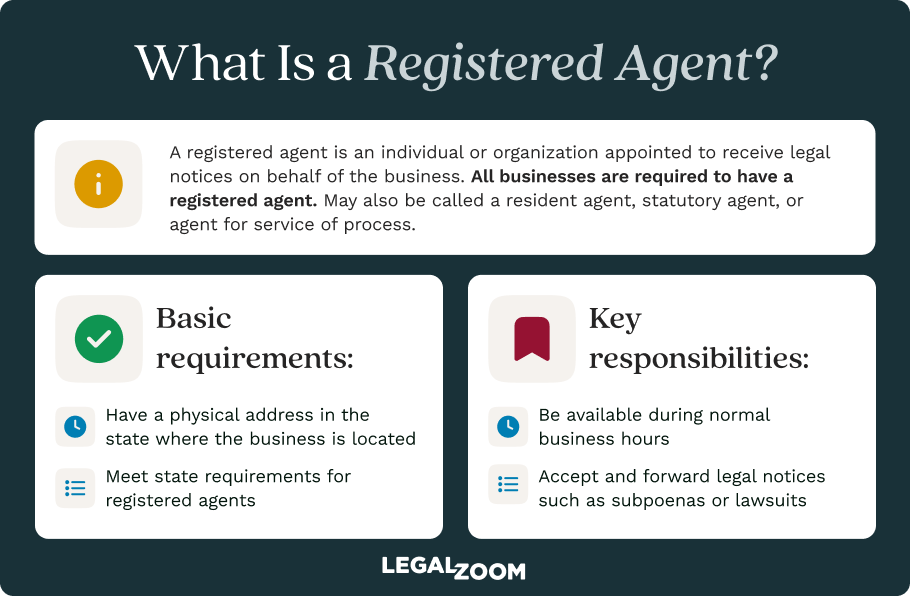A registered agent is a person or entity in charge of receiving and forwarding state and legal communications for and to your business. This required role also helps business owners like you feel confident that important documents won’t get lost in the mail.
Whether you’re starting a new venture in Alexandria, Richmond, or elsewhere in the Old Dominion, learn registered agent guidelines and how to select the right agent for your company.
What is a registered agent in Virginia?
A registered agent is a person or entity that your business designates to receive official legal correspondence, like annual report notices, subpoenas, or lawsuits. Formal business entities—such as corporations or limited liability companies (LLCs)—must designate a registered agent to officially form in Virginia. It's a necessary legal requirement under the Code of Virginia.
The registered agent serves as your business's official point of contact with the Virginia State Corporations Commission (SCC) and the courts. This includes receiving the following:
- Service of process (legal documents such as lawsuits)
- Annual report notices and reminders
- Tax notices and correspondence
- Official government communications
- Legal notices and subpoenas
In Virginia, this role is different from a resident agent, which is a person or entity that receives official communications on behalf of a nonresident who owns and leases property in Virginia.
Who can serve as a registered agent in Virginia?
Based on the Code of Virginia, a Virginia registered agent must be one of the following:
- A Virginia resident who holds a management position in the business
- A Virginia resident who is a member of the Virginia State Bar
- A business entity (other than the registering company) that’s authorized to transact business in Virginia
All registered agents must also:
- Agree to serve as the registered agent in writing
- Have a physical street address in Virginia that’s the same as the registered office (not a P.O. box, unless the agent is in a town of 2,000 of less with no available street address)
- Be available at the registered office during normal business hours (Monday to Friday, 9 a.m. to 5 p.m.)

Can I be my own registered agent in Virginia?
Yes, you (or an employee of your business) can serve as your own registered agent in Virginia if you meet the above requirements. However, you may prefer to hire a professional service for the security and flexibility.
Below are some of the benefits and drawbacks of being your own agent.
| Pros | Cons |
|---|---|
| No additional cost | Must be available at the registered office during regular business hours |
| Direct control over documents | Office address becomes public record |
| Immediate access to legal notices | Risk of missing important documents when traveling or unavailable |
| No third-party dependency | May appear less professional |
| Risk of being served a lawsuit at your office |
When being your own agent makes sense
- You have a dedicated business office in Virginia.
- Your agent can always be available during normal business hours.
- You don't mind if your office address is public record.
- You have systems in place to handle and track important legal documents.
When to consider a professional service
- You work from home and value privacy.
- You travel frequently or don't maintain regular office hours.
- You want professional document handling and scanning services.
- Your main office is out of state.
How to appoint a registered agent in Virginia
All new businesses appoint their registered agent when they file formation documents in VA. These documents vary based on your business structure.
Here’s what you’ll need.
- For an LLC. Fill out articles of organization (Form LLC1101) and include your registered agent’s name, address, and qualification (e.g., indicate if they are a member of the Virginia State Bar, a manager of the LLC, or an authorized entity). Then, pay the $100 filing fee.
- For a corporation. Submit articles of incorporation (Form SCC619) with your registered agent’s name, address, and qualification. The filling fee starts at $25 plus $50 for every 25,000 shares up to a maximum of $2,500 for more than 1 million shares.
- For a nonprofit corporation. File articles of incorporation for a nonstock corporation (Form SCC819NP), include your registered agent’s information, and pay the $75 filing fee.
- For a foreign LLC. Designate your registered agent in your application of certificate of registration (Form LLC1052). The filing fee is $100.
- For a foreign corporation. Use the application for a certificate of authority (Form SCC759) to designate your registered agent and pay the filing fee. It’s $25 plus an entrance fee that depends on whether or not your business will issue stock and how many shares.
You can file electronically by creating an account with SCC or mail a physical form to the State Corporation Commission. The SCC will review your application and send you an acceptance letter (or email) to let you know your business legally exists. This letter also confirms your registered agent appointment.
Alternatively, LegalZoom can register your business for you.
How to change your registered agent in Virginia
You can always change your registered agent if your circumstances change. Just log into your SCC account and file a statement of change of registered office/registered agent or download the form and mail it to the State Corporation Commission. Make sure to update your records after the SCC confirms the change.
Or, if you use LegalZoom as your registered agent, we’ll perform the change for you.
Why should you use a registered agent service in Virginia?
Besides access to the additional services that they may offer, many businesses choose to work with a professional registered agent for the peace of mind that comes with expertise.
- Enhanced privacy. Professional services provide a business address that’s not your personal or professional address, confidential handling of sensitive legal documents, and protection from unwanted visitors or process servers at your place of business.
- Reliable compliance. You’ll have access to automated reminders for important deadlines and backup storage to ensure nothing is missed.
- Flexibility. A service allows you to travel freely during business hours, work remotely and flexibly, and focus on running your business.
- Document management. Professional agent services like LegalZoom offer digital scanning and storage and text or email notifications when important documents arrive.
Why choose LegalZoom as your Virginia registered agent?
In our 20+ years of experience helping people start their businesses, we’ve seen it all when it comes to ever-evolving compliance requirements. As your registered agent, we stay on top of changes in state requirements and send alerts when we receive important correspondence so that you’ll never miss a beat.
Here are some of the perks of using LegalZoom’s registered agent service based in Virginia Beach:
- Added privacy. Critical legal notices come to our address instead of your home or workplace.
- Time-sensitive alerts. You’ll receive alerts for important and time-sensitive mail.
- Guaranteed availability. Our Virginia office is open during normal business hours to receive official mail and meet legal requirements.
- Digital storage. Our service includes unlimited secure cloud storage so you can access critical business documents anytime, from anywhere.
- Junk mail filtering. You only get the information that matters, and skip the stuff you don’t need.
- Seamless transition services. If you want to make us your new registered agent, we'll cover any fees and take care of the paperwork at no cost to you.
FAQs about registered agents in Virginia
What happens if I don't maintain a registered agent in Virginia?
If your business fails to maintain a registered agent, the Virginia SCC will send notices to your last known address. If you don't appoint a new agent within 31 days of your current agent's resignation, the SCC can change your business status to "terminated," "revoked," or "canceled."
This requires going through a reinstatement process, which involves additional fees and paperwork.
Does the registered agent need a Virginia street address?
Yes, the registered agent must maintain a physical street address in Virginia. P.O. boxes are generally not allowed unless the registered agent is located in a town with a population of 2,000 or fewer and no street address is available.
What's the difference between registered agent, registered office, and principal office?
- A registered agent is the person or entity that you designate to receive legal documents and official mail on behalf of your business.
- A registered office is the physical address where the registered agent is available to receive documents during business hours.
- A principal office is your business' main office, which may be different from the registered office.
Can I change my registered agent at any time?
Yes, you can change your registered agent at any time by filing a statement of change of registered office/agent with the SCC. You can designate the change to be effective immediately or on a future date that you specify.
How do I find a list of registered agents in Virginia?
The Virginia SCC maintains public records of VA registered agents. You can search business records through the SCC's online database. However, for privacy reasons, many businesses choose commercial registered agent services rather than list individual’s names.
What if my registered agent moves or goes out of business?
If your registered agent moves outside Virginia or ceases operations, they should provide you with written notice. You then have 31 days to appoint a new registered agent before facing potential penalties from the SCC.
Can a registered agent serve multiple businesses?
Yes, both individual and commercial registered agents can serve multiple businesses simultaneously, as long as they meet all the requirements for each business they represent.
Do I need a registered agent if I'm a sole proprietorship?
No, sole proprietorships don’t register a business entity with the Virginia SCC and therefore don’t need registered agents. However, if you form an LLC or corporation, you will need a registered agent regardless of whether or not you're the only owner.
Edward A. Haman, Esq. and Kathleen Crampton contributed to this article.



